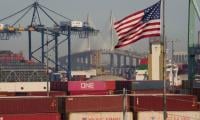BASF wants to increase footprint into Pakistan
KARACHI: BASF, a world’s leading chemical producer is identifying the need of new industrial solutions in Pakistan in the wake of Chinese-funded infrastructure developments as the company wants to increase its footprint into the country, its top official said.
“We need to work with our prime clients, the OEMs (original equipment manufacturers) and their partners to take advantage of the China-Pakistan Economic Corridor (CPEC),” Vice President Asia Pacific BASF Jui Seng Tay told The News during his recent visit to the country.
“A lot of investment is flowing into the country and a lot more is to come as I have heard some western OEMs are also considering investment in Pakistan, and if true it would take the growth sentiment of the (chemical) industry even to the next level.”
Ludwigshafen, Germany-based BASF manufactures fiber intermediates, nylon and melamine fibers, resins and finishing compounds in addition to offering industrial designs.
BASF has been present in Pakistan for more than four decades. Currently, it has a production site in Karachi, while the company’s offices are located in Karachi, Lahore, Kasur, Sialkot, and Islamabad.
The company employs 100,000 people at its more than 300 production sites worldwide.
Tay said the company is closely monitoring how the foreign OEMs are shaping the chemical industry forward in Pakistan. “As the OEMs come to Pakistan their partners would also come, translating into additional foreign direct investment.”
The official said BASF believed in meeting their clients’ needs and providing them with custom made solutions and the company, having huge base in China, would support the local team in Pakistan.
“BASF provides chemicals as well as designing solutions,” the official said. “I am here to meet our industrial clients to know what exactly they need.”
Faisal Akhtar, managing director at BASF Pakistan said the company has been evolving and innovating since its inception in Pakistan.
“Today, products and solutions from BASF help tackle challenges, such as climate protection, energy efficiency, nutrition and mobility,” Akhtar said. “This is how we ensure our long-term business success with chemistry-based solutions for almost all the sectors.”
As Pakistan grows and continues its journey towards urbanisation a massive amount of construction is needed to build housing units for the population.
“Solutions that BASF is developing are the answers to the growing demand for rapid and cost-efficient construction with easy maintenance and high energy efficiency,” Akhtar said.
BASF offers wide ranging solutions to the automotive industry and is focused on driving research and innovation to address the challenges, such as emission reduction, heat management, e-mobility, light weight construction and fuel efficiency.
The BASF’s country head said huge quantity of chemicals is being imported. Undervaluation is depriving the government of revenue, while local manufacturers are denied of a level-playing field.
Akhtar, citing conservative estimates, said Pakistan annually imports five billion dollars of chemicals.
He said electricity shortage is another challenge facing the industry. “We provide chemicals and raw material to almost all the industries, and a lot of industrial units are out of production or not operating at their optimum,” he added. “Had there been no electricity shortage our business would have expanded many times in Pakistan.”
-
 Meta’s Internal Memo Reveals How Executives Ignore Safety Warnings To Push Messenger Encryption Rollout Despite Risks To Teen Safety
Meta’s Internal Memo Reveals How Executives Ignore Safety Warnings To Push Messenger Encryption Rollout Despite Risks To Teen Safety -
 Robert Carradine's Shocking Suicide Answer 'lies' In Brother David Old Tragic Incident
Robert Carradine's Shocking Suicide Answer 'lies' In Brother David Old Tragic Incident -
 'CIA' Star Tom Ellis Drops Bombshell Reason Why He Stayed Away From 'FBI': I Know What They Do'
'CIA' Star Tom Ellis Drops Bombshell Reason Why He Stayed Away From 'FBI': I Know What They Do' -
 Biographer Calls Andrew National Security Risk: ‘This Huge Can Of Worms Is Getting Closer To King’
Biographer Calls Andrew National Security Risk: ‘This Huge Can Of Worms Is Getting Closer To King’ -
 DeepSeek Under Fire: Anthropic Accuses Chinese AI Firm Of Misusing Claude For Unauthorized Model Training
DeepSeek Under Fire: Anthropic Accuses Chinese AI Firm Of Misusing Claude For Unauthorized Model Training -
 Would You Drive In A Driverless Taxi? AI-powered Robotaxis Roll Out In London Amid Growing Debates Over Road Safety, Passenger Convenience
Would You Drive In A Driverless Taxi? AI-powered Robotaxis Roll Out In London Amid Growing Debates Over Road Safety, Passenger Convenience -
 Trump’s Tariff Plan: 10 Percent Rate Takes Effect Despite 15 Percent Announcement Following Supreme Court Ruling
Trump’s Tariff Plan: 10 Percent Rate Takes Effect Despite 15 Percent Announcement Following Supreme Court Ruling -
 Eric Church Reveals How Vince Gill Made His Brother Barndon's Death 'a New Normal'
Eric Church Reveals How Vince Gill Made His Brother Barndon's Death 'a New Normal' -
 Harry, Meghan Offer Help To Beatrice, Eugenie As They Navigate Big Decision
Harry, Meghan Offer Help To Beatrice, Eugenie As They Navigate Big Decision -
 Robert Carradine's Heartbroken Brother Keith Breaks Silence On Actor's Tragic Death
Robert Carradine's Heartbroken Brother Keith Breaks Silence On Actor's Tragic Death -
 Taylor Swift Embraces Herself As Her Career Hits Major Milestone: 'I Am Blown Away'
Taylor Swift Embraces Herself As Her Career Hits Major Milestone: 'I Am Blown Away' -
 How Deepfake Scams Are Reaching Record Levels By Targeting Social Media Users: Everything You Need To Know
How Deepfake Scams Are Reaching Record Levels By Targeting Social Media Users: Everything You Need To Know -
 Andrew’s Arrest Takes Over US Elites: ‘They’re Calling Lawyers In Fear The Police Will Pounce’
Andrew’s Arrest Takes Over US Elites: ‘They’re Calling Lawyers In Fear The Police Will Pounce’ -
 China Trains DeepSeek On Nvidia’s Most Advanced AI Chip Blackwell Despite US Export Ban
China Trains DeepSeek On Nvidia’s Most Advanced AI Chip Blackwell Despite US Export Ban -
 Beatrice, Eugenie To Follow In Prince Harry’s Footsteps With Bombshell Memoir?
Beatrice, Eugenie To Follow In Prince Harry’s Footsteps With Bombshell Memoir? -
 Daniel Radcliffe Replacing Hugh Jackman As Wolverine In X-Men Reboot? Actor Sets Record Straight
Daniel Radcliffe Replacing Hugh Jackman As Wolverine In X-Men Reboot? Actor Sets Record Straight



